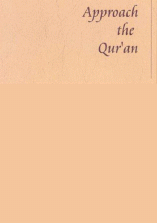Approach the Quran

The Merits of Memorizing the Glorious Qur'an
We see many Muslims memorize the Glorious Qur'an although they do not know Arabic. This includes Muslims from India, Pakistan, Afghanistan, Turkey, Senegal, and other countries in Asia and Africa. I tested the memorization of some non-Arab Muslims in Qatar and witnessed their accuracy in memorizing the Glorious Qur'an. However, when I asked any of them about his name, no one could reply, as they did not know Arabic.
This is, obviously, the fulfillment of the Divine Promise, We have, without doubt, sent down the Message; and we will assuredly guard it (from corruption).
(Al-Hijr: 9)
Allah, Most High, has promised to preserve His book and consequently He prepares those who memorize it through consecutive generations. I memorized the Glorious Qur'an before the age of ten. In Bangladesh, I saw a nine-year-age child who had memorized the Glorious Qur'an. In Egypt, many children memorize the Glorious Qur'an at the age of seven according to the competitions that are held among them in this regard. One of those children visited Qatar where the minister of Education honored him a few years ago. In Shibin Al-Kum, a village near my village in Egypt, I saw a child of the same age memorize the Glorious Qur'an and recite it in the correct way according to the rules of recitation (Tajwid).
Recently, some educationalists criticize the memorization of the Qur'an at an early age without understanding its meaning, claiming that people should not memorize what they do not understand.
However, this contemporary attitude should not be applied to the Glorious Quran. There is no harm on the child to memorize the Glorious Qur'an while young and understand it when he becomes older. Memorization at an early age, according to a saying of wise people, is like carving on stones. By Allah's grace, I memorized the Glorious Quran in my early childhood And benefited from it in my old age.
As mentioned above, the Glorious Qur'an distinguished by its simplicity and easiness to be memorized, and so everyone, young or aged, educated or unlettered, can understand it to some extent.
In the Kitttab,[1] I came to understand the general meaning of the Qur'anic stories and admonitions although I was a mere child. Once, I was reciting Surat As-Safat before sheikh Hamid (may Allah have mercy on him), when I read the following Qur'anic verses:
(So also was Lat among those sent (by Us). Behold, we delivered him. And his adherents, all, except an old woman who was among those who lagged behind. Then we destroyed the rest. Verily, ye pass by their (sites), by day and by night: will ye not understand)
(As-Safat: 133-138)
According to the division of the verses in the Mus-haf ,[2] the verse No. 137 ends with (…ye pass their (sites), by day}; and the verse No. 138 begins with (…and by night…) but when I read The two verses I did not stop at the end of the former verse and continued reading until the word "night" in the latter verse. Thereupon, my sheikh said, "May Allah bless you!" That is because he understood that 1 continued reading until the word "night" to complete the meaning of the sentence ye pass by their (sites}, by day and by night". Although it is known in the science of Tajwid that the reader of the Qur'an is recommended to stop at the end of each verse.
Some Christians, furthermore, try to memorize the Glorious Qur'an or at least some parts of it and then teach it to their children. ln this connection, we remember Dr. Nazmi Luke, the Christian writer, who spoke about this in the introduction of his "Mnharnrnad: Ar-Risalah war-Rasul" (Muhammad: The Mission and the Messenger). ln his book, Dr. Nazmi said that his father sent him to a Muslim sheikh in Suez in order to teach him the Glorious Qur'an.
Makram `Ibeid, the well-known Christian politician, memorized many parts of the Glorious Qur'an and used to quote them in his speeches and writings. The Qur'anic words, in fact, added sweetness and strength to his speeches and writings.
Memorizing the Glorious Quran at an early age has many outstanding benefits, such as maintaining correct pronunciation of and compliance with the grammar of the Arabic language.
[1] Kittab is an office that teaches the Glorious Quran to children. These kinds of offices are widespread throughout Egypt, particularly in the villages. (Trans.)
[2] Mus-haf is the book containing the Ever-G1orious Qur'an.
